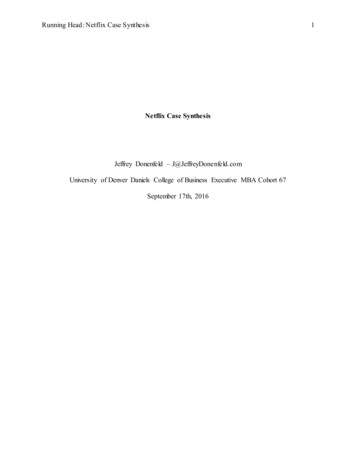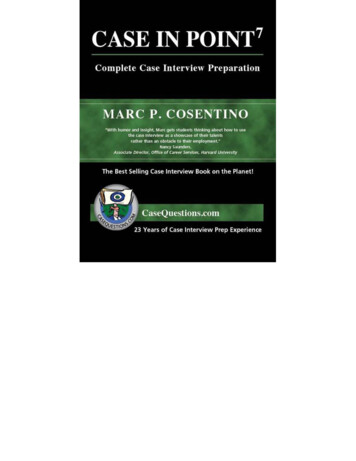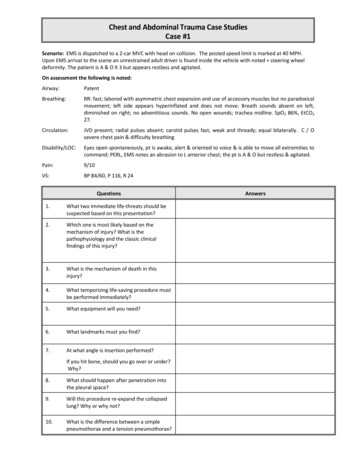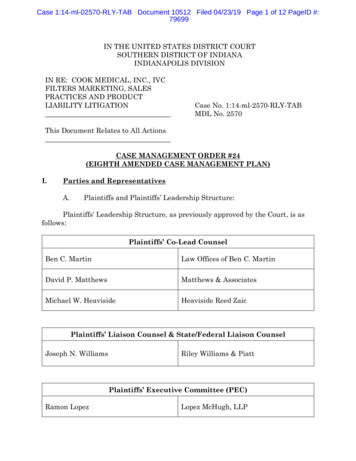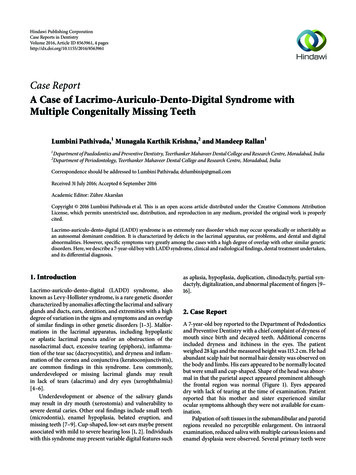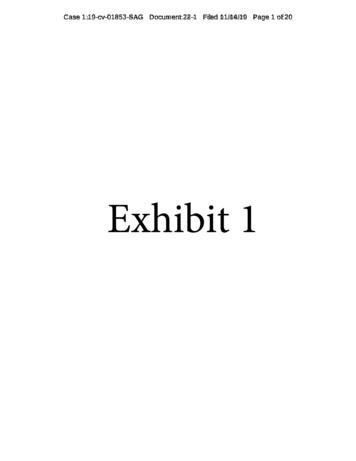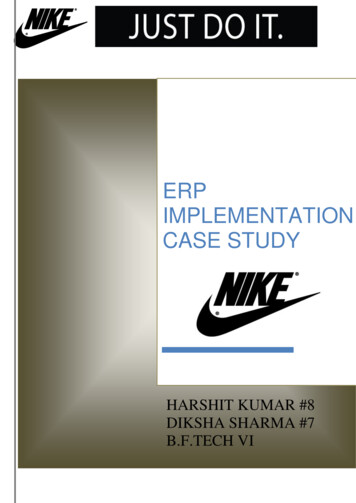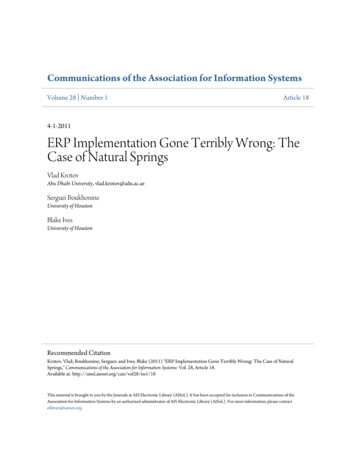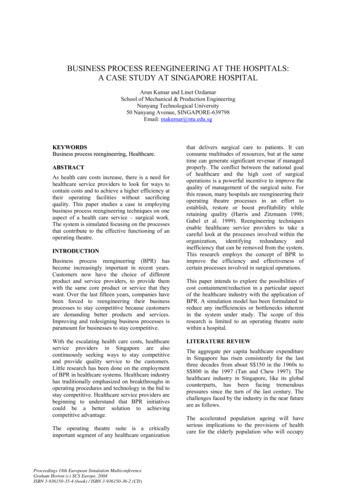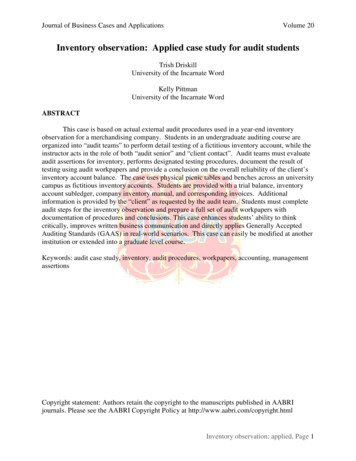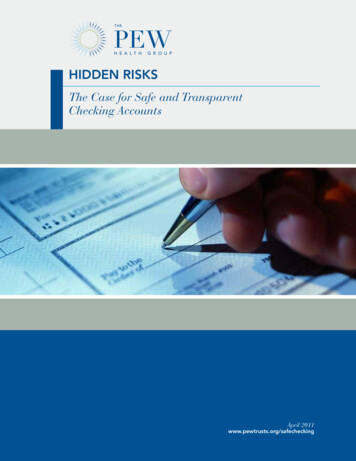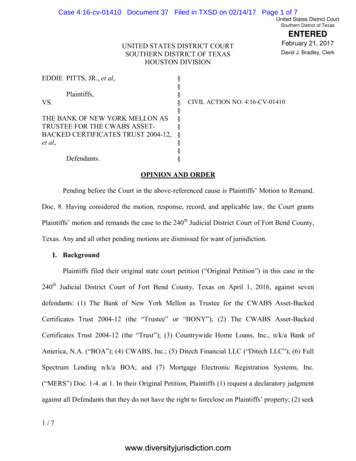
Transcription
Case 4:16-cv-01410 Document 37 Filed in TXSD on 02/14/17 Page 1 of 7United States District CourtSouthern District of TexasENTEREDUNITED STATES DISTRICT COURTSOUTHERN DISTRICT OF TEXASHOUSTON DIVISION§§Plaintiffs,§VS.§§THE BANK OF NEW YORK MELLON AS §TRUSTEE FOR THE CWABS ASSET§BACKED CERTIFICATES TRUST 2004-12, §et al,§§Defendants.§February 21, 2017David J. Bradley, ClerkEDDIE PITTS, JR., et al,CIVIL ACTION NO. 4:16-CV-01410OPINION AND ORDERPending before the Court in the above-referenced cause is Plaintiffs’ Motion to Remand.Doc. 8. Having considered the motion, response, record, and applicable law, the Court grantsPlaintiffs’ motion and remands the case to the 240th Judicial District Court of Fort Bend County,Texas. Any and all other pending motions are dismissed for want of jurisdiction.I. BackgroundPlaintiffs filed their original state court petition (“Original Petition”) in this case in the240th Judicial District Court of Fort Bend County, Texas on April 1, 2016, against sevendefendants: (1) The Bank of New York Mellon as Trustee for the CWABS Asset-BackedCertificates Trust 2004-12 (the “Trustee” or “BONY”); (2) The CWABS Asset-BackedCertificates Trust 2004-12 (the “Trust”); (3) Countrywide Home Loans, Inc., n/k/a Bank ofAmerica, N.A. (“BOA”); (4) CWABS, Inc.; (5) Ditech Financial LLC (“Ditech LLC”); (6) FullSpectrum Lending n/k/a BOA; and (7) Mortgage Electronic Registration Systems, Inc.(“MERS”) Doc. 1-4. at 1. In their Original Petition, Plaintiffs (1) request a declaratory judgmentagainst all Defendants that they do not have the right to foreclose on Plaintiffs’ property; (2) seek1/7www.diversityjurisdiction.com
Case 4:16-cv-01410 Document 37 Filed in TXSD on 02/14/17 Page 2 of 7to quite title in their names; and (3) allege that MERS, BOA, BONY, and the Trust violatedSection 12.002 of the Texas Civil Practice and Remedies Code. See id.On May 19, 2016, BONY, the Trust, and Ditech LLC (collectively, “Defendants”) timelyfiled their Notice of Removal on the basis of diversity jurisdiction. Doc. 1. In their Notice ofRemoval, Defendants recited the citizenship of the following parties in support of their claims aware/NewYork),theTrust(Delaware/New York–on account of the Trustee’s citizenship), Countrywide (Delaware/NewYork), BOA (Delaware/North Carolina), CWABS, Inc. (Delaware), Ditech LLC (Florida,Delaware, Minnesota, Maryland), and Full Spectrum (Delaware/North Carolina). Doc. 1 at ¶¶10–16. Plaintiffs responded with their Motion to Remand, arguing that in light of the SupremeCourt’s March 7, 2016 ruling in Americold Realty Trust v. Conagra Foods, Inc., 136 S. Ct. 1012,194 L. Ed. 2d 71 (2016), Defendants were required to prove the citizenship of all the Trust’smembers/beneficiaries in order to shoulder their burden that removal was proper. Doc. 8 at ¶ 3.Because Defendants have not done so, Plaintiffs argue that this Court lacks subject-matterjurisdiction. Id. Plaintiffs’ Motion to Remand is now ripe for adjudication.II. Legal StandardUnder the federal removal statute, “any civil action brought in a State court of which thedistrict courts of the United States have original jurisdiction, may be removed by the defendantor the defendants, to the district court of the United States for the district and division embracingthe place where such action is pending.” 28 U.S.C. § 1441(a). Although suits arising underfederal law are removable without regard to the citizenship of the parties, diversity suits areremovable only “where the matter in controversy exceeds the sum or value of 75,000, exclusiveof interest and costs, and is between citizens of different States.” 28 U.S.C. § 1332(a). The2/7www.diversityjurisdiction.com
Case 4:16-cv-01410 Document 37 Filed in TXSD on 02/14/17 Page 3 of 7burden is on the removing party to show removal is proper. Mumfrey v. CVS Pharmacy, Inc., 719F.3d 392, 397 (5th Cir. 2013) (citation omitted). “Any doubts regarding whether removaljurisdiction is proper should be resolved against federal jurisdiction.” Vantage Drilling Co. v.Hsin-Chi Su, 741 F.3d 535, 537 (5th Cir. 2014) (per curiam) (quoting Acuna v. Brown & RootInc., 200 F.3d 335, 339 (5th Cir. 2000)) (internal quotation marks omitted).III. AnalysisThere is no disagreement between the parties regarding the amount in controversy; onlythe citizenship of the Trust is in dispute. The rule relied on by Plaintiffs is that “[w]hile humansand corporations can assert their own citizenship, other entities take the citizenship of theirmembers.” Americold, 136 S. Ct. at 1014. Plaintiffs argue that this rule squarely applies becausethe Trust is neither a corporation nor a traditional trust. Doc. 8. Thus, Plaintiffs argue, Americoldmakes clear that the Trust takes on the citizenship of all of its members. Id. In a number ofsupplemental filings, Plaintiffs cite two recent district court cases that have applied Americold tosimilar disputes and remanded the case because the court concluded that the trust defendant wasa business trust and the citizenship of all the members was not demonstrated. Docs. 17, 22 (citingand attaching Swoboda v. Ocwen Loan Servicing, LLC, No. CV H-13-2986 (S.D. Tex. Sept. 16,2016) (Ellison, J.) and Juarez v. DHI Mortg. Co., Ltd, No. CV H-15-3534, 2016 WL 3906296, at*3 (S.D. Tex. July 19, 2016) (Miller, J.)).In their Reply, Defendants first point out that Plaintiffs’ Motion to Remand named“CWABS Inc. Asset-Backed Certificates Series 2004-12,” and argue that Plaintiffs’ Motion mustfail because CWABS Inc. is a corporation, not a trust. Doc. 13 at ¶¶ 4–5. Defendants next arguethat, “assuming arguendo that Plaintiffs meant to argue that the CWABS Trust is a businesstrust,” Plaintiffs’ reliance on Americold is misplaced, because unlike the Maryland statute at3/7www.diversityjurisdiction.com
Case 4:16-cv-01410 Document 37 Filed in TXSD on 02/14/17 Page 4 of 7issue in that case, “[h]ere, Plaintiffs have failed to provide any facts or legal authority to supporttheir conclusory contention that CWABS Trust is a business trust.” Id. ¶¶ 6–9. Defendants go onto argue that the Trust is not a business, pointing to their Securities 10-K filing in support,1which states “Not applicable” under the Trust’s business description. Doc. 13-2. Defendantsfurther argue that because the Trust does not act on its own, but rather BONY acts on its behalf,such as in the filing of a foreclosure suit, the Trust cannot be a business. Id. ¶ 9. Finally,Defendants point to the Pooling and Servicing Agreement (“PSA”) to argue that the Trust“governs the ‘fiduciary relationship between multiple people’”—the Americold standard for atraditional trust. Id. ¶ 11. In support of this position, Defendants direct the Court’s attention to asimilar case in which the district court retained jurisdiction because it concluded that the trustdefendant was indeed a traditional trust and the defendants had established that the parties werediverse without regard to the citizenship of the trust’s members. Doc. 23. (citing and attachingMay v. New Century Mortg. Corp., No. H-16-1272 (S.D. Tex. Sept. 16, 2016) (Lake, J.)).Alternatively, Defendants argue that the Trust’s citizenship should be disregarded because it isnot a real and substantial party as demonstrated by the fact that Plaintiffs fail to plead factualallegations as to the Trust in support of any cause of action. Doc. 13 at ¶¶ 14–17.The Court easily dismisses Defendants’ first argument. It is clear from the Complaint andthe record as a whole that Plaintiffs’ reference to “CWABS, Inc. Asset-Backed CertificatesSeries 2004-12 Business Trust” in their Motion to Remand was a mistake. Doc. 8 at ¶ 2. The title1Plaintiffs object to the 10-K and Pooling and Service Agreement (“PSA”) excerpts thatDefendants submitted as exhibits with their Reply. Doc. 17 at ¶ 3. Plaintiff argues that the 10-Kis incomplete because Defendants only attached the first two pages of the SEC filing and whatDefendants’ claim is the PSA is actually the Prospectus Supplement and not the actual PSA. Id.However, Plaintiffs direct the Court to no authority to support their objections. Both documentsare public records and relevant to the issue at the heart of this dispute. Moreover, their admissiondoes not prejudice Plaintiffs. Accordingly, the Court does not believe exclusion is warranted andoverrules Plaintiffs’ objections.4/7www.diversityjurisdiction.com
Case 4:16-cv-01410 Document 37 Filed in TXSD on 02/14/17 Page 5 of 7of Plaintiffs’ Original Petition makes it clear that CWABS, Inc. and the CWABS Asset-BackedCertificates Trust 2004-12 are separate entities sued in their individual capacities. Doc. 1-4 at 2.Moreover, it is clear from the Motion to Remand that, regardless of whether they misnamed theTrust, Plaintiffs are attacking the jurisdictional claims of the Trust, not the corporation. See Doc.8.Defendants’ alternative argument that the Trust is not the real party in interest also fails.First, in their Original Petition, Plaintiffs list BONY in its capacity as a trustee for the Trust, andthen separately list the Trust as a party. Doc. 1-4. That they named BONY as the trustee does notmean that they are only pursuing claims against BONY. Under Texas law, Plaintiffs could onlybring the Trust into the suit by also listing BONY, the Trustee, in the pleadings. See Ray MaloolyTrust v. Juhl, 186 S.W.3d 568, 570 (Tex. 2006) (citations omitted) (“The general rule in Texas(and elsewhere) has long been that suits against a trust must be brought against its legalrepresentative, the trustee.”). Second, Plaintiffs’ allegations are directed at the Trust. Theyspecifically allege that the loan on their property never vested in the Trust and the Trustwrongfully attempted to foreclose on the property. Doc. 1-4. Finally, Defendants relied upon thecitizenship of the Trust (as based on the Trustee) in removing this case to begin with. Doc. 1 at 5.As Judge Ellison stated when rebuffing the same argument (that the defendant trust’s citizenshipshould be disregarded because it was not a real party in interest) in one of the cases cited byPlaintiffs, “[b]y relying on the RASC Trust’s citizenship in establishing federal diversityjurisdiction, Defendants acknowledged the trust as a real and substantial party to the lawsuit.”Doc. 22-1, Swoboda, at 3 n.2.After a thorough review of Americold and the three Southern District of Texas cases citedby the parties, the Court concludes that Plaintiffs’ Motion to Remand should be granted. The5/7www.diversityjurisdiction.com
Case 4:16-cv-01410 Document 37 Filed in TXSD on 02/14/17 Page 6 of 7burden here is on Defendants to establish that removal is proper and unlike the May case onwhich they rely to argue against remand, Defendants have not born “the burden of classifying thetrust by a preponderance of the evidence.” Doc. 23-1, May, at 13. In that case, the Court onlyconcluded that it had jurisdiction for two reasons. First, the record made it clear that “uponexecution and delivery of the PSA, ‘all right, title and interest’ of the Trust assets is to betransferred to the Trustee.” Id. at 11. Second, all “[a]ctions taken on behalf of the trust are‘authorized and empowered’ by the Trustee, rather than the certificateholders.” Id. Although thePSA in this case does indicate that the “all right, title, and interest” in the trust will be assigned tothe trustee, Doc. 13-4 at 7, Defendants direct the Court to no further statements elucidating howthe Trust operates. Instead, Defendants make much of the fact that the Trust is not operating as abusiness and has no officers or directors. Doc. 13 at ¶¶ 8–9. But this argument misses the mark.So too does Plaintiffs’ focus on the fact that the Trust is divided into shares represented bytransferable certificates. Doc. 8 at ¶ 12. Determining whether a trust is a traditional trust orbusiness trust does not rise and fall on what business the trust conducts or whether there aretransferrable shares; rather, who exerts control and how the entity operates is the focus of theinquiry. See Doc. 23-1, May, at 11 (“Neither conducting business nor the existence oftransferrable shares is dispositive.” (citation omitted)).Here, the burden is on Defendants to classify the trust, establish its citizenship, and provecomplete diversity. Juarez, 2016 WL 3906296, at *3 (citation omitted). Defendants have notdone so. This failure, coupled with Plaintiffs’ assertions, is “sufficient to cast doubt on whetherthis court has subject matter jurisdiction.” Id. (citing Gasch v. Hartford Accident & Indem. Co.,491 F.3d 278, 281–82 (5th Cir. 2007)). Accordingly, this Court must remand.6/7www.diversityjurisdiction.com
Case 4:16-cv-01410 Document 37 Filed in TXSD on 02/14/17 Page 7 of 7IV. ConclusionFor the foregoing reasons it is herebyORDERED that Plaintiffs’ Motion to Remand, Doc. 8, is GRANTED and this case isremanded to the 240th Judicial District Court of Fort Bend County, Texas. Accordingly, it isfurtherORDERED that all other pending motions are DISMISSED FOR WANT OFJURISDICTION.SIGNED at Houston, Texas, this 14th day of February, 2017.MELINDA HARMONUNITED STATES DISTRICT JUDGE7/7www.diversityjurisdiction.com
Court’s March 7, 2016 ruling in Americold Realty Trust v. Conagra Foods, Inc., 136 S. Ct. 1012, 194 L. Ed. 2d 71 (2016), Defendants were required to prove the citizenship of all the Trust’s members/beneficiaries in order to shou
